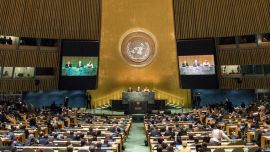Finally, Javier Milei has discovered politics. Argentina’s government obtained approval of its ‘Ley de Bases’ bill in the lower house, albeit a shortened version of 232 articles, little more than a third of its original format that stumbled last February in the same chamber. The bill now passes to the Senate, where an even more challenging scenario awaits the ruling party.
Shortly after the bill was passed in the Chamber of Deputies, a press release from the Presidency was published welcoming its approval. It expressed the President’s gratitude to deputies Cristian Ritondo, Miguel Pichetto and Rodrigo de Loredo, the heads of the PRO, Hacemos Coalición Federal and UCR caucuses respectively, for their collaboration in the drafting of the bill and their defence and support of it in the lower house.
Milei has come a long way. From describing the Chamber of Deputies as a “nest of rats,” he has come to consider those who came to his aid as “patriots.” It’s an evolution that took the president four months, if one considers the first monumental version of the law was unveiled on December 27.
It is claimed that the treatment and approval of the bill owes much to the heads of the “pro-dialogue” opposition caucuses. As professional politicians, they did indeed lead negotiations in Congress. But a change also happened – some of the government negotiators were described as “naïve” (Martín Menem) or “cynical” (Santiago Caputo). In the end they were recognised as willing to “allow themselves to be helped.”
Milei’s interlocutors were also helped by governors and trade unionists. Interior Minister Guillermo Francos – perhaps the only government official who enjoys respect – and Cabinet Chief Nicolás Posse, a man with a very low profile, staged a long series of meetings with provincial governors, as well as a key meeting in early April with the leadership of the CGT umbrella union grouping at the Casa Rosada, which was attended by veteran Caminoneros (teamsters) leader Hugo Moyano.
The bill passed in the Chamber of Deputies is the result of these meetings in which the national government, provincial governments, pro-dialogue friendly caucuses and the unions gave in. Dialogue and negotiation were the tools that gave the President his first political victory.
Calculation has also helped. Milei must have been surprised by the massive march in defence of public university funding a week ago. The conservative La Nación newspaper estimated the turnout in Buenos Aires City at 430,000 people. There were significant demonstrations in cities in the inland parts of the country where Milei swept up votes for fun in last year’s presidential run-off.
The emergence of the libertarian as a national figure is the result of a profound transformation in Argentina’s political sociology, the scope of which is still uncertain. But the demonstration in support for state universities shows that some things stay the same.
The President displaced those who had been its interlocutors during talks with university chancellors and placed Human Capital Minister Sandra Pettovello and Education Secretary Carlos Torrendell at the forefront of the dialogue. On Monday, they received the chancellor of the University of Buenos Aires (UBA). They also met with the heads of the National Inter-University Council, while the Chamber of Deputies was dealing with the omnibus bill. Photos of the two meetings were circulated.
A pragmatic approach is also showing in the economy. The government decided to postpone this month’s inflationary updating of public service tariffs and fuel duties. A few weeks ago, we also saw the turnaround regarding the increase in prepaid health schemes. The Economy Ministry is looking for inflation to continue its deceleration and hopes to be able to show a single-digit rate for April, which will be known in mid-May.
The passage of the ‘Ley de Bases’ bill is a major objective for the President. Even more important than achieving a fiscal surplus in the first quarter. The real target audience for the law is Washington, the International Monetary Fund (a technical team is in Buenos Aires) and the US Treasury, but also Beijing, where the authorities of the Central Bank met with their peers from the People’s Bank of China this week to negotiate a US$4.9-billion tranche of the currency swap used last year to meet debt commitments.
Milei has to demonstrate in these reas an ability to negotiate policy from a position of structural weakness. In addition to management, he must guarantee the sustainability of his plan, which is so far focused on fiscal and monetary balance, and how he seeks to defeat inflation.
The spirit of the omnibus bill and its accompanying fiscal package, also approved yesterday in the Chamber of Deputies, is the same as the version rejected back in summer: the declaration of emergencies, delegated powers, privatisations, changes in employment contracts, a trimming of the moratorium on pensions and the reinstatement of income tax, as well as a controversial system of tax incentives for investments worth more than US$200 million (aimed particularly at the oil and mining sectors), which could compromise the development of small- and medium-sized firms from local industry.
The most sensitive point of proposed legislation, however, seems to be the powers granted to President Milei to carry out a profound reform of the state. We are talking about a man whose utopian dream is based on its destruction.





















Comments